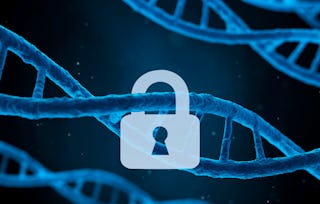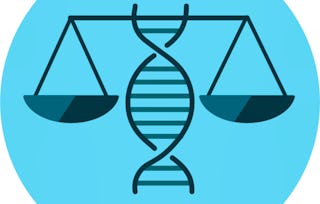How have advances in genetics affected society? What do we need to know to make ethical decisions about genetic technologies? This course includes the study of cloning, genetic enhancement, and ownership of genetic information. Course participants will acquire the tools to explore the ethics of modern genetics and learn how to integrate these issues into their classrooms.

Genetics and Society: A Course for Educators

Genetics and Society: A Course for Educators


Instructors: Rob DeSalle, Ph.D.
18,909 already enrolled
Included with
174 reviews
Skills you'll gain
Details to know

Add to your LinkedIn profile
See how employees at top companies are mastering in-demand skills

There are 4 modules in this course
You will explore the history of genetics and genomics, and be introduced to ways of thinking ethically about issues involving genetic technology. You will learn how ethical issues can be used to spark your students’ interest, and how to uncover students’ misconceptions.
What's included
4 videos6 readings1 assignment
You will explore systems biology, stem cells, and cloning and the applications of these technologies. You will also learn about the ethics of cloning, which will be the basis for your written assignment, which opens this week.
What's included
5 videos3 readings1 assignment1 peer review
You will see how genetic information is being used to individualize medical treatments and take a video tour of the Sackler Institute for Comparative Genomics at the American Museum of Natural History. You will also apply the Science and Engineering practices from A Framework for K-12 Science Education and the Next Generation Science Education Standards in considering how to engage students in discussion about ethics.
What's included
7 videos4 readings1 assignment
This week you will learn about the societal implications of genetically modified food, and discuss ways to incorporate this issue into your teaching.
What's included
3 videos6 readings1 assignment
Instructors

Offered by
Explore more from Basic Science
 Status: Preview
Status: PreviewUniversity of Cambridge
 Status: Preview
Status: PreviewUniversiteit Leiden
 Status: Preview
Status: PreviewDuke University
 Status: Preview
Status: PreviewUniversity of Illinois Urbana-Champaign
Why people choose Coursera for their career

Felipe M.

Jennifer J.

Larry W.

Chaitanya A.
Learner reviews
- 5 stars
71.83%
- 4 stars
19.54%
- 3 stars
5.74%
- 2 stars
0.57%
- 1 star
2.29%
Showing 3 of 174
Reviewed on Feb 18, 2017
This course was very informative and gives an good knowledge of the basics of genetics.
Reviewed on Oct 18, 2015
this was a fantastic course. Genetics fascinates me!
Reviewed on Mar 23, 2019
Really very informative thank you so much for this course.

Open new doors with Coursera Plus
Unlimited access to 10,000+ world-class courses, hands-on projects, and job-ready certificate programs - all included in your subscription
Advance your career with an online degree
Earn a degree from world-class universities - 100% online
Join over 3,400 global companies that choose Coursera for Business
Upskill your employees to excel in the digital economy
Frequently asked questions
To access the course materials, assignments and to earn a Certificate, you will need to purchase the Certificate experience when you enroll in a course. You can try a Free Trial instead, or apply for Financial Aid. The course may offer 'Full Course, No Certificate' instead. This option lets you see all course materials, submit required assessments, and get a final grade. This also means that you will not be able to purchase a Certificate experience.
When you purchase a Certificate you get access to all course materials, including graded assignments. Upon completing the course, your electronic Certificate will be added to your Accomplishments page - from there, you can print your Certificate or add it to your LinkedIn profile.
Yes. In select learning programs, you can apply for financial aid or a scholarship if you can’t afford the enrollment fee. If fin aid or scholarship is available for your learning program selection, you’ll find a link to apply on the description page.
More questions
Financial aid available,
¹ Some assignments in this course are AI-graded. For these assignments, your data will be used in accordance with Coursera's Privacy Notice.

